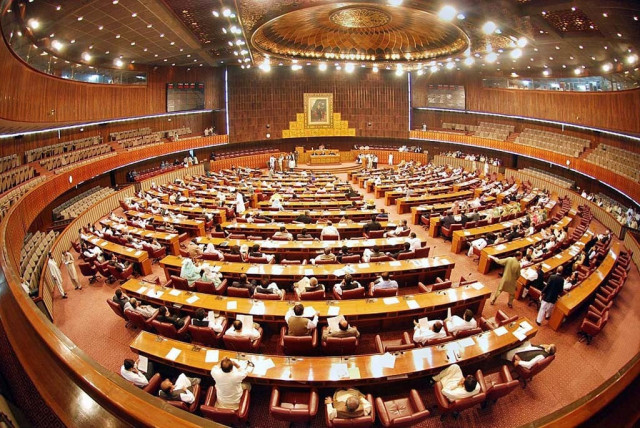PPP to table bill allowing public petitions to NA
Bill would enable citizens to address a petition to the NA on a matter which affects them directly

The Pakistan Peoples Party Parliamentarian (PPPP) is all set to table a bill which, if approved, will give citizens a right to submit a public petition to the National Assembly seeking its intervention in matters about personal or collective nature, it emerged on Monday.
The NA agenda for April 23 revealed that PPP MNA Dr Nafeesa Shah is seeking amendments in the Rules of Procedure and Conduct of Business in the National Assembly, 2007, stating that new Rules 295 and 296 shall be inserted to allow citizens to approach NA with public petitions.
The PPP lawmaker has proposed that under Rule 295 (1) (Right of petition), “any citizen of Pakistan or any natural or legal person residing or having a registered office in the country shall have the right to address, individually or in association with other citizens or persons, a petition to the National Assembly on a matter which affects him, her or them directly.”
It adds that the petitions shall be addressed to the speaker of the National Assembly and shall be titled “Public Petition to the National Assembly” and shall show the name, nationality and permanent address of each petitioner.
The third proposed clause says where a petition is signed by more than one petitioner, the signatories shall designate a representative who shall be regarded as the petitioner for the purposes of this Title.
It continues by stating that each petitioner may at any time withdraw support of the petition in writing and on withdrawal of support by all the petitioners the petition shall become null and void.
The fifth clause states that the petitions must be preferably written in official languages, either English or Urdu and sent to the NA secretariat. However, petitions in provincial or local languages e.g. Sindhi, Punjabi, Pashto, Balochi, Kashmiri, Shina, Hindko or Brahvi will also be considered.
The sixth clause says petitions shall be entered in a register in the order in which they are received if they comply with the conditions laid down in sub-rule (2); those that do not shall be filed, and the petitioner shall be informed of the reasons for this.
295 (7) states that the petitions entered in the register shall be forwarded by the Speaker to the Public Petitions Committee responsible, which shall first establish the admissibility or otherwise of the petition in accordance with these Rules.
295 (8) says that the petitions declared inadmissible by the Committee shall be filed; the petitioner shall be informed of the decision and the reasons for it. Where possible, alternative means of redress may be recommended.
295 (9) states that the petitions, once registered, shall as a general rule become public documents, and the name of the petitioner and the contents of the petition may be published by the National Assembly for reasons of transparency.
295(10) states: “Notwithstanding the provision of sub-rule (9), the petitioner may request that his or her name be withheld in order to protect his or her privacy, in which case the National Assembly must comply with the request.” It adds where the petitioner's complaint cannot be investigated for reasons of anonymity, the petitioner shall be consulted so as the further steps to be taken.
295(11) maintains that the petitioners may request that his or her petition be treated confidentially, in which case suitable precautions shall be taken by Parliament to ensure that the contents are not made public. The petitioners shall be told under which precise conditions this provision is to apply.
295 (12) says where the Committee deems it appropriate, it may refer the matter to the ombudsman or to the relevant government departments or divisions for redressal.
The Rule 296 (1) (Examination of petitions, Redressal and Report) states that admissible petitions shall be considered by the Committee where the petitioners may be invited to participate in meetings of the Committee if their petition is to be the subject of discussion, or they may ask to be present. “The right to speak shall be granted to petitioners at the discretion of the Chair,” it reads.
296(2) states: “The Committee shall submit report to the Parliament,” adding “The Committee shall, in particular, inform Parliament of the measures taken by the Committee on petitions referred to them by the Parliament.”
296(3) adds that the Committee may seek opinions from other committees that have specific responsibility for the issue under consideration.
296(4) proposes where the report deals with, in particular, the application or interpretation of law or proposed changes to existing law, the Standing Committee responsible for the subject-matter shall be associated. If the Committee responsible does not accept such suggestions, the associated committee may table them directly in the House.
296(5) says when investigating petitions, establishing facts or seeking solutions the Committee may organize fact-finding visits to the region concerned by the petition. Reports on the visit shall be drafted by their participants.
296(6) concludes that the petitioner shall be informed of the decision taken by the Committee and the reasons for the decision. When consideration of an admissible petition has been concluded, it shall be declared closed and the petitioner informed.
Separately, the PTI - now SIC - lawmakers wish to introduce a Bill further to amend the Constitution [The Constitution (Amendment) Bill, 2024] seeking amendments in Article-175A and 215. Dr Nafeesa also wishes to table a constitutional amendment bill, seeking amendment in Article 25.
The agenda shows that PPP’s Syed Agha Rafiullah wishes to move the following resolution: “This House believes that the Government should take immediate steps to ensure the payment of the minimum wages announced by the Government in the Government-run departments as well as in the private enterprises.”


















COMMENTS
Comments are moderated and generally will be posted if they are on-topic and not abusive.
For more information, please see our Comments FAQ